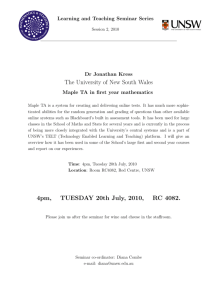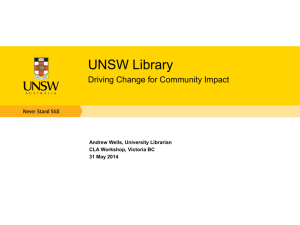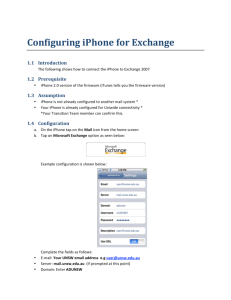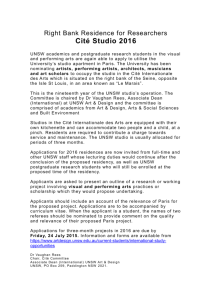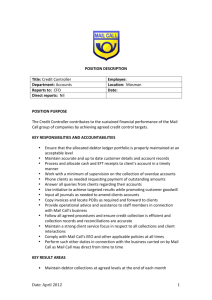E-mail Policy - UNSW IT - University of New South Wales
advertisement
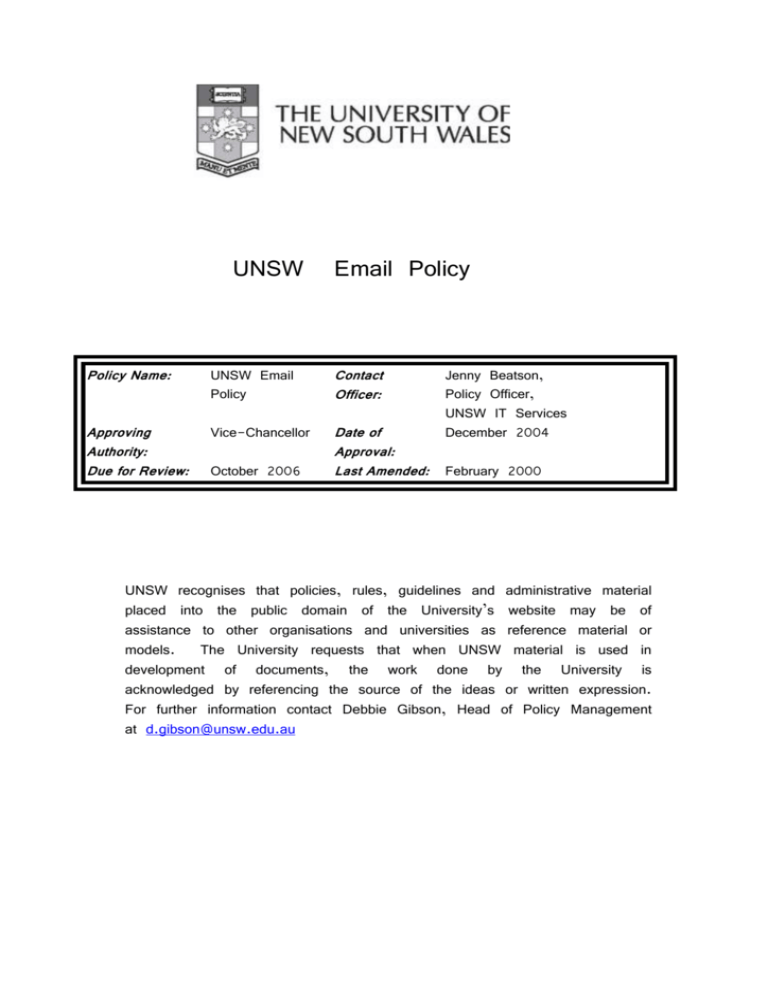
UNSW Email Policy Policy Name: UNSW Email Policy Contact Officer: Approving Authority: Due for Review: Vice-Chancellor Date of Approval: Last Amended: October 2006 Jenny Beatson, Policy Officer, UNSW IT Services December 2004 February 2000 UNSW recognises that policies, rules, guidelines and administrative material placed into the public domain of the University’s website may be of assistance to other organisations and universities as reference material or models. The University requests that when UNSW material is used in development of documents, the work done by the University is acknowledged by referencing the source of the ideas or written expression. For further information contact Debbie Gibson, Head of Policy Management at d.gibson@unsw.edu.au Email Policy This policy was first developed on 14 July 1997 by a Working Party chaired by Ms Christine Page-Hanify, Director of Information Services and Deputy Principal. The Working Party consisted of the following members: Dr Keith Burston, Manager, Communications Unit Associate Prof Graham Greenleaf Faculty of Law, Co-Director, Australasian Legal Information Institute (AustLII) Ms Debbie Osborn, Head, Policy Management Unit Mr Geoff Oakley, Manager, Computing Facilities, School of Computer Science and Engineering Ms Elizabeth Marks, Administrative Officer, Policy & Coordination, DIS In February 2000 this policy was reviewed by: Ms Christine Page-Hanify, Director of Information Services and Deputy Principal Dr Keith Burston, Manager, Communications Unit Professor Paul Compton, School of Computer Science and Engineering The Information Technology Committee The Academic Board Ms Debbie Osborn, Head, Policy Management Unit Ms Jude Stoddart, Director, Equity and Diversity Unit Ms Elizabeth Marks, Executive Officer, DIS and changes made to it by Dr Burston. Dr Burston also included the Broadcast Email Procedures in this Policy as an Appendix. In May 2003 this policy was reviewed by: Mr Peter Ivanov, Operations Manager, Enterprise Infrastructure, DIS Mr Geoff Oakley, Facilities Manager, School of Computer Science and Engineering Ms Guilaine Buckley, University Archivist Ms Judith Tonkin, Deputy Registrar Ms Claire Hill, User Services Librarian and changes made to it by Mr Ivanov. For information and assistance contact: The Office of the Chief Information Officer Extension 512000 This policy is effective from January 2004. Approved by VCAC December, 2003: Professor Rory Hume Vice-Chancellor and Principal UNSW POLICY STATEMENT Email Policy 2 Table of Contents 1 Preamble ....................................................................................................4 2 Policy Statement ........................................................................................6 2.1 2.2 2.3 2.4 2.5 2.6 2.7 2.8 2.9 2.10 2.11 2.12 2.13 2.14 3 Implementation ......................................................................................... 11 3.1 3.2 3.3 3.4 3.5 3.6 3.6 3.8 3.9 3.10 3.11 4 Regulation ................................................................................ 6 Other UNSW policies and guidelines .............................................. 6 Ethics and appropriate practice.................................................... 7 Legal framework and external agreements ....................................... 7 University’s right to read email ..................................................... 8 Directories ................................................................................ 8 Mailing lists and broadcasts ......................................................... 9 Volume and performance issues .................................................... 9 Retention of electronic mail .......................................................... 9 Training and recommendations .................................................... 10 Availability and termination of access ........................................... 10 Use of email for delivery of official information .............................. 10 Provision of computers to access email ........................................ 10 Security................................................................................... 11 Facilities ................................................................................. Directories .............................................................................. Mailing Lists ........................................................................... Charging ................................................................................ External Users ......................................................................... Performance ............................................................................ Security.................................................................................. Filtering and Blocking................................................................ Support .................................................................................. Regulation .............................................................................. Training.................................................................................. 12 12 12 12 12 12 12 12 12 13 13 Evaluation ................................................................................................ 13 Documents Referenced in the policy ................................................................... 14 Appendix: Broadcast Email ....................................................................... 15 UNSW POLICY STATEMENT Email Policy 3 Email Policy 1 Ease of establishing two-way communication with teaching staff. Preamble The University of New South Wales has recognised that electronic mail has become a major means of communication within the University community, acknowledging its benefits, the University makes electronic mail facilities available to all members of the community and is moving to make electronic mail the primary means of communication for a large proportion of official University communications. If used appropriately, electronic mail has the potential to offer the following benefits to the University and members of its community: Encouragement of team working for teaching, research and administration. A more cost-effective, timely and environmentally friendly means for the University to communicate and disseminate information, day-to-day. Fostering collaboration across and international boundaries. national A method of communication which encourages the formation of a cohesive university community over geographically dispersed sites. That UNSW will meet the expectations of potential students with regard to the services provided by a university in a competitive international environment / market. A convenient means for transaction record-keeping. business Enhanced access to teaching and research materials for some users with disabilities (in particular hearingimpaired users), who benefit from increasing amounts of materials in written form. Another means of social interaction for all students and staff, which contributes to the completeness of the UNSW experience. UNSW is also associated with include: aware of the risks electronic mail which The difficulty of providing access to suitably equipped computers for students. The increased difficulty in controlling record-keeping and legal liability issues. The awareness that email is not a secure form of communication, and that privacy and confidentiality are not guaranteed. That electronic mail may be used to deliver material inappropriate to a University context. The problems related to information overload, inevitable when large quantities of information, some of which is of marginal value, is delivered to individuals. UNSW POLICY STATEMENT Email Policy 4 That the implementation of email may result in further barriers for users with disabilities, in particular where the users may require additional technologies in order to make the most effective use of email. Overall, UNSW considers electronic mail a positive resource for the University and will work to encourage its implementation and use. UNSW POLICY STATEMENT Email Policy 5 2 Policy Statement The University will provide central electronic mail accounts for all staff and students of the University. The provision of electronic mail accounts to other members of the UNSW community will be at the University’s discretion. The Division of Information Services will provide a University Wide Network and Dial-in services so that anyone with access to a suitably equipped computer will be able to use their central electronic mail account. A limited number of general access computers will be provided in the University for students to access email. In particular the Library provides computers to access Library resources, in addition to email. Budget units will be expected to provide suitable computer resources to ensure that all staff will have access to their electronic mail accounts. Teaching units of the University have responsibility for providing access to suitable computers to support teaching programs for their students for use on UNSW campuses. This may include access to email. The University will encourage the UNSW community to make extensive use of electronic mail to support teaching, administration and research. It is accepted that it is becoming more convenient, economical, timely and environmentally sound to distribute information by email and some information may be distributed exclusively in this form. For this reason, the University will expect all staff and students to check their official email regularly. As the University’s central electronic mail services and network are limited resources, with increasing demands placed upon them, priority will be given to University-related activities. The University will place constraints on the use of electronic mail to protect its legal position with respect to telecommunications, copyright, anti-discrimination and contractual law, to ensure the confidentiality of communications and the protection of privacy, to comply with record keeping requirements and to implement other University policies, such as those on paid outside work and equity. However, within these constraints, and within the provisions governing acceptable use cited in this policy and by related policies and guidelines, personal use of electronic mail is accepted as having positive outcomes for the University. 2.1 Regulation Use of electronic mail will generally subject to regulation consistent with relevant legislation and UNSW policy guidelines. Self-regulation is expected the University will impose limits or action only where and when necessary. 2.2 be all and and take Other UNSW policies and guidelines A number of other UNSW policies constrain the use of electronic mail. Student use of electronic mail will be covered by Rules Relating to the Use of Computing and Electronic Communication Facilities at the University of New South Wales Student Misconduct Rules UNSW POLICY STATEMENT Email Policy 6 Policy for making a complaint or reporting incidents of criminal, corrupt conduct or maladministration or Protected Disclosure at UNSW. Staff use of electronic mail must consistent with UNSW Code of Conduct Policy for making a complaint be or reporting incidents of criminal, corrupt conduct or maladministration or Protected Disclosure at UNSW. Staff may use electronic mail for outside work only in a manner consistent with the conditions set out under the University of New South Wales Policy for Paid Outside Work by Academics or its successor. University policies on equity, such as the Equity and Diversity Policy Statement are equally applicable to communications undertaken by electronic mail as to those undertaken verbally or in writing. Electronic mail messages sent or received by employees in the course of their official duties are official records of the University which must be kept to meet various legal requirements. These messages are therefore subject to the University’s Recordkeeping Policy and Electronic Recordkeeping Policy which impose significant obligations on individual employees. 2.3 Ethics and appropriate practice Electronic mail may not be used for commercial purposes (except as noted in 2.2, where the usage is for acceptable outside work), and must be consistent with the relationship that the individual user has to the University. The sender, whether institutional or individual, must be clearly identifiable in all transmitted messages. The transmission of unsolicited electronic mail should only occur where the recipient can be identified as having a high probability of having a particular interest in the subject matter. This excludes the generalised transmission of, for example, political or recreational material except to self-subscribing mailing lists. Electronic mail should not be sent in such a way as to harass users. In general, if a recipient indicates that they do not wish to receive further messages on a topic, or from an individual or group, then no further messages should be sent. Clearly, exceptions exist for compulsory administrative mailing lists or broadcasts. Any user aware of misuse of email has a responsibility to report it to the Division of Information Services or to the unit operating the system being accessed. It is expected that all email communications will be expressed professionally and courteously, in a manner which is not likely to cause unnecessary offence, taking into account the diverse culture of the University. References to articles on “good email practice” are available from the Division of Information Services student IT support desk. 2.4 Legal framework and external agreements Users of electronic mail must be aware that electronic mail is subject to the full range of laws applying to other communications, including copyright, breach of confidence, defamation, privacy, contempt of court, harassment, vilification and anti-discrimination legislation, the creation of contractual obligations, and criminal laws. Electronic mail can be the subject of a subpoena or legal discovery order. UNSW POLICY STATEMENT Email Policy 7 The use of electronic messaging which enables the University to collect, store, use or disclose personal information, including sensitive personal information, may be subject to the Privacy and Personal Information Protection Act 1998 (NSW), the Privacy Act 1988 (Commonwealth) and the University’s Privacy Management Plan. The storage and communication of electronic mail in and by UNSW computer and telecommunications systems are protected by criminal law provisions in computer crime laws and telecommunications interception laws. 2.5 University’s right to read email The immediacy of email, and the ability to use it to contact a wider group of people conveniently can, in some cases, make it easier to inadvertently be in breach of the law. Users must also be aware that the wide dissemination of electronic mail in some circumstances may lead to more severe legal consequences than other communications, and to consequences in other jurisdictions. Users of electronic mail must be aware of these constraints when complying with other UNSW Policies affecting use of electronic mail, particularly those concerning misconduct. UNSW has a responsibility to ensure the service it provides is used appropriately, and in order to do so may exercise its legal right to read any electronic mail sent via its systems. Electronic mail is regarded by the University as similar to paper mail in relation to issues such as disposal and retention. As electronic mail messages may constitute State Records under the State Records Act 1998, users of electronic mail must be aware of the disposal and retention requirements imposed under the Act. Those staff members operating non-central systems are obliged to provide information to users of the system, in advance, if there are any additional circumstances under which anyone other than the sender or recipient may read email. Some laws and agreements require the University to give access to electronic mail and information about electronic mail to parties outside the UNSW community. These include telecommunications legislation, freedom of information legislation, other legal rules (eg concerning subpoenas), and agreements with external Internet suppliers that govern the transmission of email. Electronic mail on central systems will be read (other than by the sender and recipient) if necessary to maintain the functions of the email system or where a direction to do so is given by a member of the University Executive, or a person authorised by a member of the Executive to request such information. The information viewed by any third party authorised to read email (ie other than the sender or recipient), will only be used for the sanctioned purpose. 2.6 Directories The University will provide directories listing electronic mail addresses. To ensure that the business of the University is carried on efficiently, email users will need to justify their exclusion from public directories. UNSW POLICY STATEMENT Email Policy 8 2.8 To limit the quantities of unsolicited mail, members of the University must not provide external organisations with copies of directories or subsets greater than those accessible via the Internet. 2.7 Mailing lists and broadcasts Transmission of mail to multiple users must be controlled so that users do not receive a large quantity of unwanted and unsolicited mail as this can reduce the effectiveness of the electronic mail service. Users may solicit mail on a particular topic by subscribing to a mailing list from which they can also unsubscribe at will. Mailing list owners are required to create a meaningful list title for the information of recipients. For the purposes of this Policy, any collection of email addresses used to send multiple copies of an email item is classed as an “email list”. Unsolicited email may only be sent to multiple users where the mailing is related to their University function and the sender has an appropriate work relationship. For example, Heads of School mailing to their staff, academics mailing their classes, financial administrators mailing all those with financial delegations etc. Special interest groups must issue invitations to join before including any group or individual in a mailing list, and members have the right to unsubscribe at will. Sending of unsolicited broadcast email to all members of the University, or a substantial subset (such as all academics), requires the approval of the Vice-Chancellor (see Appendix for procedures). Volume and performance issues Performance and cost of the electronic mail systems for all users can be adversely affected by inconsiderate use by particular individuals. Therefore, the University reserves the right to set limits on: The size of individual electronic mail items sent. The total volume of electronic mail sent. The amount of electronic mail retained on central electronic mail servers. The University pays for electronic mail incoming to the University. While clearly in most cases users are not responsible for the electronic mail sent to them, they may encourage such mail. Therefore, users should not solicit large volumes of incoming mail with no, or marginal, relevance to their role within the University. The University reserves the right to request that users unsubscribe from external mailing lists where unacceptable costs are incurred. The University also reserves the right to block email containing computer viruses or worms, material not relevant to the University, unsolicited email or email which causes performance or security issues to University email servers. 2.9 Retention of electronic mail The record-keeping and archival practices and procedures of the University for the retention of written documentation in paper and other hard copy formats have been developed to ensure that public UNSW POLICY STATEMENT Email Policy 9 accountability and properly met. audit requirements are Where electronic mail messages are sent and received by an employee of the University, acting in that capacity, they form part of the official record of the University, and will be viewed in the same way as other hard copy formats of written documentation. The record-keeping and archival practices and procedures of the University which apply to hard copy formats of written documentation also apply to email messages. The retention of electronic mail is covered by the UNSW Electronic Recordkeeping Policy. In particular, attention is drawn to the following extract: “Where the electronic record is the only record of the business activity, it will be maintained in electronic form as long as required in accordance with relevant statutes, regulations, archival purposes and business needs.” 2.10 Training and recommendations The University will, from time to time, recommend appropriate electronic mail packages and configurations, and provide information on the installation and use of such packages. The University will provide training on the use of electronic mail from technical, best practice and cost/benefit perspectives. 2.11 Availability and termination of access Electronic mail accounts will be available centrally to all enrolled students and all staff. Other members of the UNSW community will be required to apply on an annual basis. Access to the service will be terminated when the user ceases to be an employee or enrolled student of the University. Other members of the community will be required to re-apply on an annual basis. The University reserves the right to terminate the access of any user whom it believes is not operating in accordance with the policy. 2.12 Use of email for delivery of official information It is acceptable, and encouraged, to use email to deliver official information related to the administration, teaching or research of the University to staff and students. For official purposes, items sent by email will be considered to be equivalent to those sent in writing. All staff and students will have an official email address constructed from the staff or student numbers. All official email should be directed to this email address. By default, email sent to these addresses will be delivered to the central email accounts operated by the Communication Unit. If the member of staff or student does not use their central email account, they are responsible for arranging email to be forwarded to the account they use. It is the responsibility of the Division of Information Services to provide uncomplicated ways to forward official mail. Staff and students are required to read their email regularly to ensure that important information is received in a timely manner. 2.13 Provision of computers to access email UNSW POLICY STATEMENT Email Policy 10 Provision of computers to enable access to electronic mail accounts for staff and other non-student members of the University community is the responsibility of individual budget units. In accordance with DEST guidelines, HECS liable and non-fee-paying HECS exempt students must be able to complete their chosen award without facing additional course-related charges imposed by the University. Although the Academic Board has recommended in its policy on Information Technology Students: Requirements for UNSW “That UNSW will expect all new students to have off-campus access to a standard modern computer with CD drive and Internet connectivity (eg via a modem). The software on the computer should include: …Email software able to link to a popserver…”. to be compliant with DEST guidelines, the University must ensure that students have at least minimal access to their official email at no cost. 2.14 Security The University cannot guarantee the confidentiality or undiscovered alteration of electronic mail messages, sent internally or via the Internet, unless steps are taken to guard against disclosure. It is the responsibility of the senders, recipients, and managers of electronic mail systems to exercise due diligence to ensure the protection of confidential communications. and does occur in the current environment. Whether crude or sophisticated, it is recommended that, should electronic mail suggest an unusual course of action, recipients should seek to verify the authenticity of the message via some other form of communication. This may take place via personal contact, paper mail, fax, or telephone, or an authentication means. In order to enhance the reliability of material, it will normally be necessary to employ digital cryptography. In small groups, this can be accomplished by secret key cryptographic methods using a large variety of cipher methods. However, for organisations as large as the University, this implies the use of public key cryptographic ciphers. Users are reminded that email should not be used to send sensitive and confidential information unless the appropriate security measures including encryption have been taken. This is required to guarantee the security of the information transferred. 3 Implementation The Division of Information Services will be responsible for the Policy, and for the central facilities required to provide electronic mail. Other budget units providing electronic mail services are required to comply with this policy to the greatest extent possible. While most users operate electronic mail in an ethical and legal manner, the University advises that forgery of electronic mail can UNSW POLICY STATEMENT Email Policy 11 3.1 Facilities It is the responsibility of the Division of Information Services to maintain central servers available to all members of the University, and to regulate their use. 3.2 Directories It is the responsibility of the Division of Information Services to provide a Universitywide directory, which will include email addresses. Although the Division of Information Services will endeavour to include all email addresses that are on the central systems, it cannot automatically include those from local email systems. It is the responsibility of all email users to ensure that their directory entry is current. The directory will be available over the Internet as a WWW page. Searching the directory will require entry of a minimum of two characters from a surname to impede the compilation of complete copies by outside organisations. 3.3 3.6 It is the responsibility of the Division of Information Services to monitor the performance of the existing central email system and its usage in order to ensure the service meets the needs of its users within the available resources. 3.6 Security It is the responsibility of the Division of Information Services to investigate a range of key cryptographic ciphers to determine the method best suited to the University’s needs. As national and international standards are established, the University will ensure that all members of UNSW will have access to trustworthy sources of electronic information and a reliable encryption method, and will promulgate their use. 3.8 Filtering and Blocking The Division of Information Services will provide filtering and blocking of email addressed through the central email service (@unsw.edu.au and @student.unsw.edu.au addresses) The service will provide virus scanning and limited blocking of email based on sender or recipient address, or data patterns contained within the email. Charging 3.9 The University reserves the right to review and consider, from time to time, the levying of a charge for electronic mail services. 3.5 Performance Mailing Lists It is the responsibility of the Division of Information Services to make available a mailing list system for creating email lists and to establish lists for valid purposes (as defined by this Policy under Item 2.7) on request. 3.4 an annual basis may be charged an annual management fee. External Users Those members of the University community who are required to reapply for accounts on Support It is the responsibility of the Division of Information Services to evaluate and recommend client software, and to provide basic user documentation for the facilities. The University encourages budget units to utilise the central email facility. It is the UNSW POLICY STATEMENT Email Policy 12 responsibility of the Division of Information Services to assist those units wishing to migrate to the central service. Units, Deans and the University Executive will be consulted as part of any evaluation. Evaluation criteria will include: The Division of Information Services Helpdesk will provide support for staff using the central facilities (where recommended software and hardware are used) and the Division of Information Services student IT support desk (the DIS><Connect desk) will provide support for students. 3.10 Regulation It is the responsibility of the Division of Information Services to administer usage of the central service and to discontinue the service to any user who is considered to be in breach of this policy or any other UNSW rules or policies, or applicable Federal or State law. Any such decision may be appealed to the Chief Information Officer. 1. The degree Policy. of compliance to 2. The degree to which email facilities are available to staff and students. 3. The degree to which email facilities are used as alternate or additional to traditional forms of communication. The Division of Information Services will actively canvas opinions at intervals and will welcome unsolicited submissions at any time. Budget units that implement local email systems are responsible for ensuring that those systems comply with University policy. 3.11 Training The Division of Information Services will make training available in standard electronic mail software packages. 4 Evaluation The success of this policy and technological implementation will evaluated periodically. the its be Stakeholders, including users, University staff, the student body, Heads of Budget UNSW POLICY STATEMENT Email Policy 13 Documents referenced in the policy Electronic Recordkeeping Policy http://www.infonet.unsw.edu.au/poldoc/erk.htm Rules Relating to the Use of Computing and Electronic Communication Facilities at the University of New South Wales http://www.infonet.unsw.edu.au/poldoc/rulcomp.htm Student Misconduct Rules http://www.infonet.unsw.edu.au/poldoc/stumis.htm Policy for making a complaint or reporting incidents of criminal, corrupt conduct or maladministration or Protected Disclosure at UNSW, http://www.infonet.unsw.edu.au/poldoc/protected_disclosure.htm UNSW Code of Conduct http://www.hr.unsw.edu.au/poldoc/codecond.htm University of New South Wales Policy for Paid Outside Work by Academic, http://www.hr.unsw.edu.au/poldoc/outwork.htm Equity and Diversity Policy http://www.infonet.unsw.edu.au/poldoc/equity.htm Recordkeeping Policy http://www.infonet.unsw.edu.au/poldoc/recordke.htm State Records Act 1998 (NSW) http://www.austlii.edu.au/au/legis/nsw/consol_act/sra1998156/index.html Privacy and Personal Information Protection Act 1998 (NSW) http://www.austlii.edu.au/au/legis/nsw/consol_act/papipa1998464/index.html Privacy Act 1988 (Commonwealth) http://scaleplus.law.gov.au/html/pasteact/0/157/top.htm Privacy Management Plan http://www.infonet.unsw.edu.au/poldoc/privacy.htm Academic Board Policy “Information Technology Requirements for UNSW Students” http://www.secretariat.unsw.edu.au/acboard/approved_policy/information_technology_requirements.p df UNSW POLICY STATEMENT Email Policy 14 Appendix: Broadcast Email Persons wishing to send email to a substantial fraction of staff and/or students should note the following: 1 There is no mechanism to send email to all members of a particular group (such as "all staff"). This is for a number of reasons: not all users read their email regularly, not all email accounts are held centrally (there are many local mail servers with their own operating methodologies), not all users on central email servers (particularly those created several years ago) are classified into groups such as "academic staff", "general staff" etc. At best, coverage will be a substantial fraction of users. people use their “official” email address. This will improve as more 2 When distributing mail to several hundred people, there can be no expectation of confidentiality. 3 The process of delivering in the technology, not in staff") can take several typical, depending on the email to large groups is inherently slow. This is a limitation staff resources. A large mailing list (such as "all academic hours to work through on the mail servers. Three hours is system loading. The Communications Unit has created and will maintain the following incomplete lists, bearing in mind the limitations above: All All All All All people on email (ie all students, staff and others with accounts), staff (defined as those with UNSW staff numbers, students, academic staff, general staff. The procedure for sending broadcast emails is: 1 2 3 4 The sender must obtain the approval of the Vice-Chancellor or acting Vice-Chancellor. If at all possible, give reasonable notice to Communications Unit staff. This will ensure a quicker response. Staff are only guaranteed to be available from 9 am to 5 pm on weekdays. Compose the mail message using text only – not as Microsoft Word attachments etc, which can only be read by a fraction of users. Email the required content to: UNSW POLICY STATEMENT Email Policy 15 5 Broadcast-request@explode.unsw.edu.au indicating distribution (eg all staff) and authority obtained. Telephone extension x 51111 and confirm that the email has been received and to obtain an estimate on when it can be sent. The confirmation stage is essential to avoid problems with staff not seeing email immediately. Generally 30 minutes will need to be added to the distribution time for checking and reformatting before actual mailing out commences. If you have any enquiries, please contact the Communications Unit on x 51111. UNSW POLICY STATEMENT Email Policy 16

